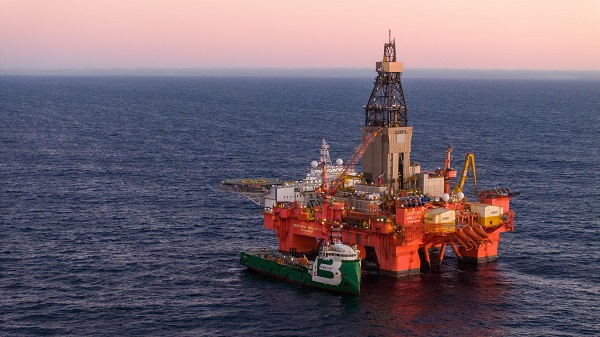Springfield Exploration and Production Limited has launched a new appraisal campaign on the Afina 1-x field, a development that could potentially add some 50,000 barrels per day (bpd) to the national output if successful.
The indigenous oil company, in partnership with the Ghana National Petroleum Corporation (GNPC), announced the arrival of a semi-submersible rig, Deepsea Bollsta, to begin a month-long appraisal of the oil block located offshore in the Western Region.
Speaking at the appraisal launch, Springfield’s Chief Executive Officer (CEO), Kevin Okyere expressed the company’s excitement at the beginning of the process.
“I am pleased to announce that the Mobile Offshore Drilling Unit, the Deepsea Bollsta, has arrived in Ghana and commenced re-entry and the Drill Stem Test of Afina 1-x in line with the Appraisal Programme,” he explained.
Assets Head, West Cape Point Three (WCPT) Block 2, Jerry Greenfields of GNPC, praised the swift mobilisation: “Within the space of three months, we were able to mobilize this rig. It is a feat that is rarely achieved by the major companies. They are not able to mobilize that quickly.”
The campaign follows a July 2024 ruling by an international arbitration tribunal, which called for further works before the unitisation of the Afina and Sankofa fields due to evidence that both fields belong to the same reservoir.
The arbitration had stalled Springfield’s efforts since 2019, when the company first made the discovery of hydrocarbons after drilling the well.
The unitisation directive, issued by the authorities, required Springfield and Italian oil major Eni, operators of the Sankofa field, to work together to optimise production from the shared reservoir.
The Deep Sea Bollsta, a rig sourced from Norwegian firm – Northern Ocean Limited (NOL), has now arrived in Ghana and is set to re-enter the Afina-1×Well, approximately 4 kilometers deep into the seabed which is located 70 kilometers offshore in the Western Region.
“This exercise will take about a month to six weeks due to how complicated and complex these operations are,” the CEO explained.
Springfield’s appraisal campaign brings together an array of international companies including Halliburton and Schlumberger as well as local contractors, its CEO added.
Okyere underscored the significance of involving domestic companies, stating, “Local content is very key to us. As a 100 percent local content company, we always ensure that there’s good participation in the local content on our campaigns.”
While Springfield has sought to ensure local participation in the campaign, the CEO also addressed recent false reports regarding the progress of the appraisal.
“There have been recent reports from local sources implying that Springfield has completed a recent appraisal of the Afina field and there is some new appraisal report that contradicts the original data that was presented to justify the unitisation. This is blatantly false,” he stressed.
“The rig just got to Ghana a few days ago. We just commenced implementation of our appraisal programme and we are yet to acquire the relevant data from our appraisal activities, process the said data and submit our appraisal report,” he affirmed.
Investment and self-funding
Springfield has invested heavily in the appraisal, committing approximately US$65 million to the campaign, taking its total expenditure past US$200 million, according to the CEO.
The entire project has been self-funded, with no financial backing from local or international banks. “Unfortunately, we have not been fortunate enough to get any local or regional banks to support us financially. So we have been funding this entire project since 2012 from revenues and profits generated from our other businesses,” he explained.
Despite the financial burden, Springfield remains optimistic about the future. The company’s leadership believes that the discovery of hydrocarbons in the Afina field, and the successful appraisal of the well, will help reverse the country’s declining oil production.
“We are very optimistic that within the next six months, after completion, we will start making some positive progress and helping add more production to Ghana’s produce,” he added.
This comes as the country’s oil production has decreased from 71.4 million barrels in 2019 to 48.25 million barrels in 2023, with an average yearly decline of about 10 percent.
Dr. Thomas Manu, Springfield’s Vice President responsible for Geosciences and an industry veteran with over 35 years of industry experience, explained that the DST will assess the flow rate of the well.
“We will measure the rate, shut it in for a period of time, let the pressure build up again, and then open it again a number of times. And then we believe that we will satisfy that condition that was required by the court,” he stated, whilst assuring stakeholders that it will adhere to stringent safety protocols.
